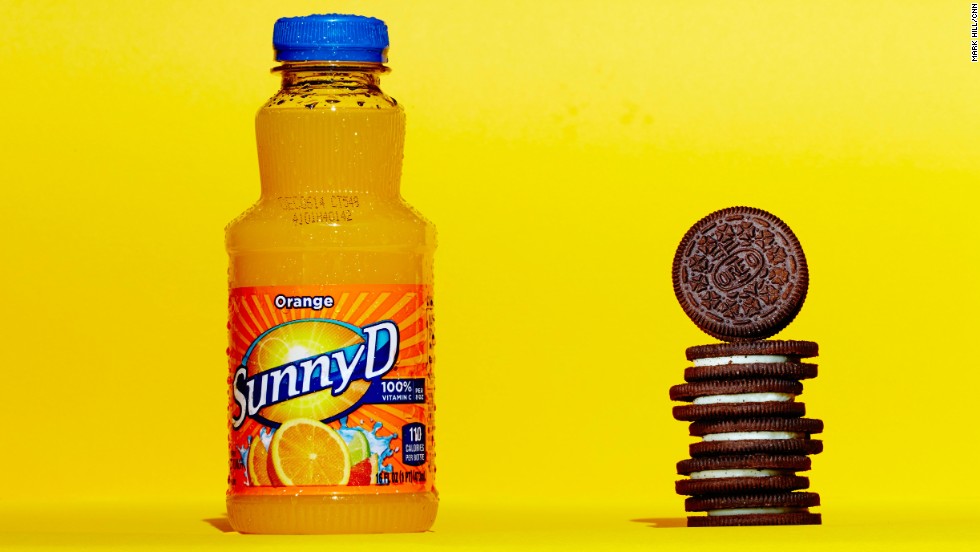Dr. Bob's Mouthly Report
Drinking too much fruit juice (or any sugary drink) linked to premature death
by Robert Glisci, DDS, PC on 05/24/19

Many sugar-sweetened beverages have little to no nutritional value and lots of calories, and their harmful health effects have been well-documented. Now, a study links drinking too many sugary beverages -- and even 100% natural fruit juices -- to an increased risk of early death.
Specifically, drinking an excessive amount of fruit juice could lead to an increased risk of premature death ranging from 9% to 42%, according to the study, published Friday in the journal JAMA Network Open.
Overall, the sugars found in orange juice, although naturally occurring, are pretty similar to the sugars added to soda and other sweetened beverages, the study suggests.
"Sugary beverages, whether soft drinks or fruit juices, should be limited," Jean A. Welsh, a co-author of the study and an assistant professor in the Department of Pediatrics at Emory University in Atlanta, wrote in an email.
Read more at CNN
Five more states take legal action against Purdue Pharma for opioid crisis
by Robert Glisci, DDS, PC on 05/24/19
Five states announced Thursday that they are taking legal action against Purdue Pharma and members of the Sackler family who control the drug company, accusing them of deceptively pushing powerful painkillers and misrepresenting the drugs’ safety as the pills sparked the opioid crisis.
Attorneys general of West Virginia, Maryland, Kansas, Iowa and Wisconsin took part in the coordinated effort against the manufacturer of the powerful narcotic OxyContin. All but Kansas targeted at least one member of the Sackler family, former president Richard Sackler, and Maryland named seven family members but not the company in an administrative filing.
In a news conference, West Virginia’s attorney general, Patrick Morrisey said his state was seeking to hold both the company and Richard Sackler responsible for deaths and other harms from the worst drug epidemic in U.S. history.
Read more at the Washington Post
Ultra-Processed Foods Tied To Higher Calorie Consumption And Weight Gain
by Robert Glisci, DDS, PC on 05/24/19

In recent years, many nutrition experts have linked the obesity epidemic to the spread of ultra-processed foods that are engineered to have a long shelf life and irresistible combinations of salt, sugar, fat and other additives.
These foods tend to make people overeat because they are full of refined carbohydrates, added sugars and fat that appeal to the human palate, experts say. Most of these foods, however, tend to lack fiber, protein, vitamins and other important nutrients.
Now a small but rigorous new study provides strong evidence that not only do these foods tend to make people eat more, but they also may result in dramatic and relatively rapid weight gain and have other detrimental health effects.
Read more at the New York Times
The best mouthwash you can buy
by Robert Glisci, DDS, PC on 05/24/19

There are myriad brands of mouthwash out there, and many are specially formulated to appeal to narrow sectors within the oral care marketplace. So whether you're looking for intense, eye-watering rinse mouthwash that lets you know you just must be slaughtering bacteria by the millions or you prefer a gentler, more palatable rinse that won't feel like breathing fire, there’s an option for you. Whether you prefer an all-natural mouthwash made with ingredients you can readily pronounce or you want to go full-on science and trust the methyl salicylate and propylene glycol to do their thing, then you're looking in the right place.
Read more at Business Insider
Dude, where’s my regulatory framework? As CBD gains popularity, Washington struggles to keep up
by Robert Glisci, DDS, PC on 05/24/19

Online reviews proclaim CBD (Cannabidiol) a “life changer,” “the best thing ever,” and “truly incredible.” It’s a $390 million industry, expected to grow to at least $1.3 billion by 2022. Montel Williams has his own designer line of CBD products; so do Tommy Chong and Mike Tyson.
Despite the rave reviews, CBD is giving Washington a major headache. The Food and Drug Administration has different rules for regulating medicines and dietary supplements like vitamins — and it isn’t perfectly clear yet which category CBD, or cannabidiol, an extract of cannabis used as a home remedy for everything from anxiety to back pain, falls into. Congress, too, has struggled. Lawmakers passed a bill last year that officially legalized hemp, the plant from which CBD is extracted, but left the FDA with little guidance on how to regulate CBD.
This isn’t the typical regulatory morass story, either. The FDA is often criticized for a “slow and burdensome approval process” that keeps promising cures from patients in need, but when it comes to CBD, lawmakers, consumer advocates, and even CBD manufacturers are unified: They want more regulation, and fast.
Read More at STAT